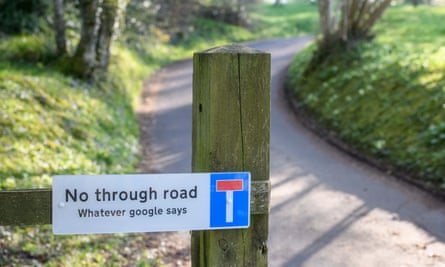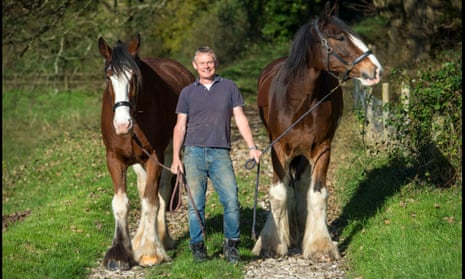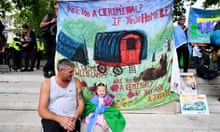The spot is idyllic – a wooded West Country hillside with tumbling streams and banks of bluebells rising above a picture postcard Dorset town built of honey-coloured stone.
But a planning dispute involving a showbiz star and a ‘new traveller’ family who have lived peacefully on their plot of land among the trees for more than two decades is disturbing the sylvan tranquility.
The actor Martin Clunes and his wife, Philippa Braithwaite, a television producer, are fighting an application by neighbours Theo Langton and Ruth McGill for permanent permission to live on their plot, arguing they are not Travellers and therefore do not have the right to a base there.

Langton and McGill, artists who travel around shows and festivals, told the Guardian they are upset and frustrated that their very identities are being questioned.
“I am a new traveller,” Langton said. Over the years there have been a number of decisions and rulings that have concluded the pair are indeed Travellers. “I can’t believe I’m having to prove myself again,” he said.
Their home – on land they own – is modest and even at this time of year when the trees are not in full leaf is hard to see from the narrow lane it borders.
The site includes a caravan and timber clad structure used as living spaces, a workshop and a motor van for trips to shows. There is a compost toilet and water comes from two springs.
In the spring sunshine it had the air of a scene from Thomas Hardy, who set his stories in this landscape and often wrote about the travelling people who lived in and moved through it.
In planning terms, the question of whether they are Travellers is important because if they are it strengthens their right to the base. The charity Friends, Families and Travellers defines new travellers as cultural rather than ethnic Travellers. Their culture “grew out of the hippy and free-festival movements of the 1960s and 1970s”.

But, more than this, it is upsetting for Langton and McGill that their definition of who they are is being disputed. “It’s quite traumatic for us,” McGill said. “We are new travellers. We travel a lot, we take our work with us when we go.”
The dispute is causing consternation in the nearby town of Beaminster, where most residents the Guardian spoke to expressed empathy for Langton and McGill. It also highlights the chronic shortage of Gypsy, Traveller and new traveller pitches.
Dorset councillors had seemed set to back the application after its officer, Bob Burden, clearly defined Langton and McGill as a “Traveller family” in a report on the application, adding: “The majority of the applicants’ travelling is to show and sell items at a variety of fairs/gatherings and/or festivals, often going from one to the next.”
Burden said “the need for Gypsy and Traveller pitches” was a “material consideration” and there was a “sporadic and limited” supply of sites in Dorset.
He concluded: “Given the context of difficulties identifying sites generally for Gypsy/Traveller families, coupled with the low-key presence and limited visual impact of this particular site, it is considered that it would now be reasonable to permit this on a permanent basis for this particular Traveller family.”
after newsletter promotion
The case was due to be discussed at a planning meeting on Thursday but the council postponed its decision after receiving a letter from lawyers for Clunes, star of Men Behaving Badly and Doc Martin, and Braithwaite, who live in a large house with stables and extensive grounds bought from Langton’s mother, the garden designer Georgia Langton, in 2007.
The lawyers, who had consulted planning expert John Steel KC, argued that the success of the application largely hinged on Langton and McGill’s identity.
They said: “There is no evidence in the application before the council that either applicant is currently a Traveller within the meaning of planning policy.”
The letter added: “Mode of clothing or hairstyle or the form, type and location of residence is not important” and alleged the council would be acting unlawfully to class Langton and McGill as Travellers.
The lawyers also claimed the lack of mains water meant the site was a “potential health hazard” and alleged one of the living spaces did not have the planning permission that it needed.
Abbie Kirkby, the public affairs and policy manager at Friends, Families and Travellers, which works to end racism and discrimination against Gypsy, Roma and Traveller people, said there was a desperate shortage of sites.
She said: “The chronic lack of safe stopping places and sites for travelling communities, compounded by the hostile environment of expansive anti-Traveller enforcement powers, means that families are left with little to no choice of where they can go.
“Many traditional stopping places have been closed off with the majority of planning applications facing objections, frequently underpinned by prejudicial views against Gypsy and Traveller people. Research has shown that many local authorities are not complying with their duty to identify land for sites, with families on the sharp end of these failings.”
Nobody at the Clunes and Braithwaite house wanted to comment but in Beaminster residents pointed out that Langton volunteers at the food bank and used to serve on the council. One shopkeeper, who asked not to be named, said: “They are lovely people, assets to the community and I’d be very sad to see them go.”
Contributors to the town’s Facebook page, Beaminster Banter & Ranter, have picked up on the dispute. One supporter of Langton and McGill said: “People with their own land should be allowed to live on it in peace.”
Another said: “I would hate to see a family who have lived happily in the town for over 20 years become homeless. Theo and Ruth have done no harm to this town and have helped many groups. It’s their home on their land and they should be able to stay.”









